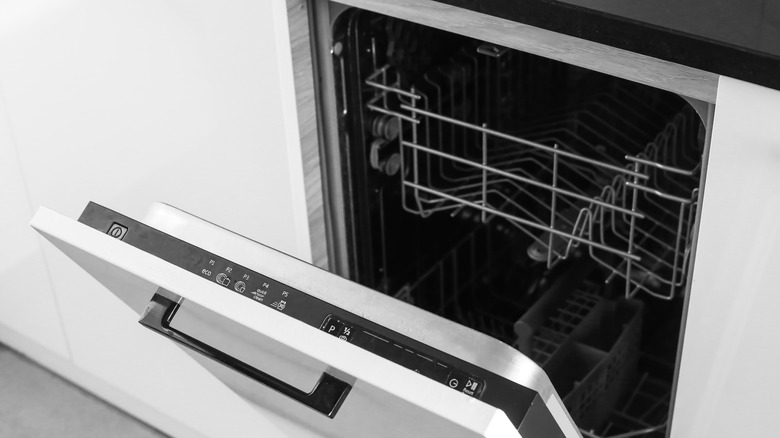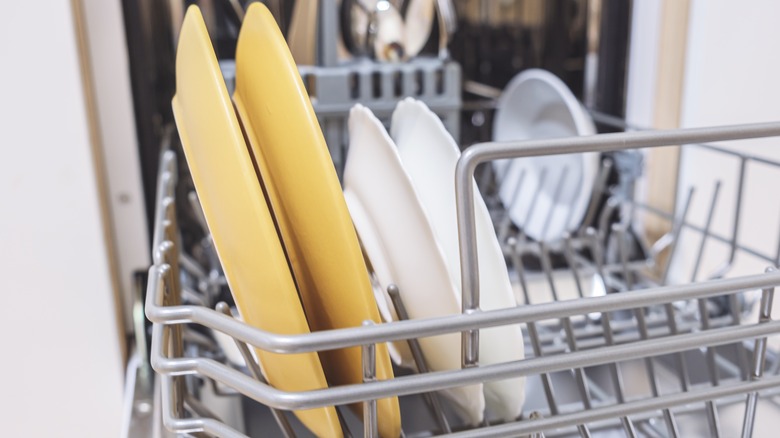5 Tips For Choosing The Right Dishwasher For Your Kitchen
Replacing your dishwasher is a big decision. Dishwashers can be expensive, and there are a great many features to consider when scouring the market for a new model to add to your kitchen. Service One notes that a dishwasher is likely to last for about 15 to 20 years before requiring a replacement. This means that selecting one that fits your needs is crucial. After all, you'll be using this appliance for a decade or longer, and selecting the wrong one will result in many years of annoyance or even hardship. Compact Appliance suggests that problems in keeping your dishwasher door closed, rust, or static water sitting within the unit after a wash has been completed are all signs that your dishwasher is nearing the end of its functional lifespan.
For anyone thinking of replacing their dishwasher, the wide variety of features, sizing considerations, and more can really muddy the water when browsing through options. But making this selection doesn't have to be a difficult process. With a few key tips in mind and a starting point that places your current and potential future needs at the forefront of the decision-making process, you can evaluate dishwasher models with an open mind and select one that best suits your ongoing needs.
Consider unit size and your kitchen's configuration
When looking into new dishwasher replacements for your home, the first thing you should consider is the size of your existing dishwasher space. Overwhelmingly, American (and worldwide) households place dishwashers in the kitchen and very close to the sink (via Ross's Discount Home Center). This means that the two features that each require a water hookup can use the same plumbing infrastructure. It also means that your dishwasher must fit under the counter. Likewise, most homeowners incorporate one of a few standard-size holes in their lower cabinet space to accommodate the size of their existing dishwasher. These units come in a variety of different dimensions and so starting with measurements of your existing model can help you select a one-for-one replacement when it comes to fitting the new machine in your kitchen.
It's certainly possible to install a larger or smaller dishwasher, and there are benefits of making this alteration in the kitchen. However, most homeowners will want to stick with the same dimensions to cut down on additional augmentations to the kitchen layout.
Evaluate energy efficiency ratings
Energy efficiency ratings are another core component in the decision to select one dishwasher over another; they are graded differently depending on where you live. In Europe, appliances are graded on a scale of A to G, with an A rating signifying the best performance in this metric (via Energy Saving Trust). The United States makes use of Energy Star labels, which show typical costs and usage ratings to make purchasing decisions more transparent (via U.S. Department of Energy). A higher rating will cost you a little more, but this is a tradeoff in long-running costs. Higher energy efficiency translates into lower running costs over the decade or more that you'll use the appliance. Similarly, dishwashers with better energy efficiency are more environmentally friendly as a result of their lower usage ratings.
Bringing energy efficiency statistics into your decision-making process can help you select the best possible dishwasher for your long-term needs, both in running repeat cycles to clean your dishes and in keeping bills as low as possible while preserving the environment that you call home.
Think about your budget and consider stretching it a bit
As with any major purchase, it's important to consider your budget carefully. Setting aside cash for replacement appliance purchases is fairly typical. You might also want to consider actually buying the unit with a credit card that offers travel points or cash-back perks. Regardless of how you ultimately fund this expense, contemplating your budget and coming up with a reasonable price that you can afford for this essential unit is immensely important. Budgeting is a core skill for any homeowner, and this extends to emergency replacements just as it does to rent or mortgage payments and monthly electricity bills or cable charges. Forbes Home estimates that the average dishwasher will cost about $970, including installation. However, prices can vary widely, with high-end units costing over $3,000.
A top-of-the-line dishwasher may not be right for your home and budget, but it is always worth thinking about an upgrade to the next tier when considering appliances and other purchases that you'll use for years on end. Many homeowners will run their dishwasher multiple times per week, or perhaps even every single day. This makes the importance of purchasing a high-quality unit something that can't be overstated. Stretching your budget in order to buy a better model is a way of borrowing against your future self. Of course, only you can set your budget, but it's always worth considering an upgrade for these types of purchases.
Look inside selected units to gain a sense of layout and organization
When viewing dishwasher models, you will want to open up the unit in question and consider how the interior layout works with your unique collection of silverware, cups, bowls, and plates. Every home's cooking and eating utensils will be somewhat different. Dimensions are often similar, but no two sets will ever be exactly the same. This means that no two homeowners will ever load their dishwashers in exactly the same manner. Taking the time to explore the interior space of dishwasher models you're considering purchasing can help you get a better understanding of how the unit will function in your own home.
It's a good idea to take pictures, jot down notes, and play around with the racks positioned inside the dishwasher. Consumer Reports also notes that you should look for compartments, interior lights, ball-bearing-enhanced rollers, and other features. A hands-on experience is a great way to make the most of this buying opportunity. It can be difficult to fully grasp the interior dimensions and features by reading reviews or looking at pictures. If you can get your hands on a physical model, you should always take the opportunity to inspect it yourself.
Understand available wash cycles
Lastly, evaluating wash cycle options is an important component of the buying experience when it comes to dishwashers. In the same way that energy efficiency can play an outsized role in the expense of running this appliance, a variety of different wash cycle options can help you maintain control over cleanliness in your home and the expense of that end. Many new dishwashers incorporate eco cycles and quick wash options. These features may not be available on older or less expensive models. So thinking through the ways in which you use your dishwasher and the frequency with which you might run a small load or a fully stocked wash can help you make this decision a little easier.
It's also worth considering how loud the dishwasher is when run on each available cycle option. Décor Tips reports that a typical dishwasher might run between 45 and 60 decibels. If the model you're considering purchasing is louder, it may not be suitable for use at night and can even become a nuisance if you run it in the evening while trying to watch TV or spending quality time with loved ones. These types of considerations are built into the wash cycle selection. Therefore, thinking about your optimal washing conditions can help make this decision easier.





